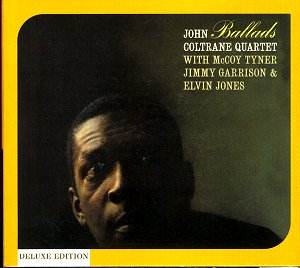JOHN COLTRANE
BALLADS (DELUXE EDITION)
John Coltrane - tenor & soprano saxophones ; McCoy Tyner - piano
; Jimmy Garrison - bass ; Elvin Jones - drums.
Jones and Garrison do not play on Disc Two, track 1.
Disc One, track 7 and Disc Two, tracks 3 - 14 recorded 21/12/1961.
Disc One, tracks 6 and 8 recorded 18/9/1962.
Disc One, tracks 1 - 5 and Disc Two, tracks 1 and 2 recorded 13/11/1962.
Recorded at Van Gelder Studio, Englewood Cliffs, New Jersey.
Produced by Bob Thiele, engineered by Rudy Van Gelder.
 Impulse! 589 548-2 Impulse! 589 548-2
|

Crotchet
midprice
|
DISC 1:
1. Say It ( Over And Over Again )
2. You Don't Know What Love Is
3. Too Young To Go Steady
4. All Or Nothing At All
5. I Wish I Knew
6. What's New?
7. It's Easy To Remember
8. Nancy ( With The Laughing Face )
DISC 2:
1. They Say It's Wonderful
2. All Or Nothing At All
3. Greensleeves
4. Greensleeves
5. Greensleeves
6. Greensleeves
7. Greensleeves
8. It's Easy To Remember
9. It's Easy To Remember
10. It's Easy To Remember
11. It's Easy To Remember
12. It's Easy To Remember
13. It's Easy To Remember
14. It's Easy To Remember
The " Ballads " album by John Coltrane has always been
one his more controversial releases. It seems strange that such a relatively
straightforward record along with the session with Johnny Hartman and,
to a lesser extent, the date with Duke Ellington should have sparked
such a mixed reception, and for the reason for these records to be so
much a subject for debate. There are many theories as to why these albums
were made including the idea that Coltrane was undergoing embouchure
and/or dental problems at this point in his career. The other much vaunted
idea is that these sessions were done on the advice of Bob Thiele to
bring Coltrane to the attention of a broader audience .
On examination of the performances themselves it seems
difficult to sustain the idea that John Coltrane was having any physical
problems with his playing at this time . The very thought of performing
mainly slow tunes is the last thing any saxophone player would consider
if he had these hindrances. The level of control and accuracy is far
higher for this type of music. A singular aspect of the selections on
this disc is the high tessitura to be found on virtually every piece
- most saxophonists approach the ballad with concept of displaying the
warmer areas of the instrument i.e. the lower to middle register. Coltrane
frequently starts the melody statement in the upper part of the tenor's
range and it is often necessary for him to go into the harmonics to
make the tune fit in the same octave. His control here is very good
, this is decidedly not the playing of a man with problems!
So we are left with the idea that these recordings
were made to achieve greater popularity. The whole point of this controversy
is that at this point in his career John Coltrane was right at the cutting
edge of the music and therefore these performances were considered to
be out of character. I would like to advance the argument that Coltrane
was such a free spirit in his ideas about music that these records were
just another attempt at a different approach - his ballad performances
here have a purity and simplicity not to be heard on many of his other
renditions in this genre -certainly not in his earlier years.
And so to the recordings themselves -they have long
been amongst my favourites, and certainly do not suffer from the re-mastering.
Coltrane's playing is superb throughout, showing great control and a
really concise style in his presentation - quite different from his
usual garrulous nature. The rest of the quartet is, as always, sheer
perfection . It is impossible to select tracks as the standard is absolutely
consistent and the choice of material superlative. The previously unreleased
numbers are all of a level comparable to the original album and are
therefore most welcome ( the piano/tenor duet on "They Say Its Wonderful"
is a real bonus). To sum up this is one of the essential albums in Jazz
and it is made even more attractive by the excellent gatefold packaging
complete with original and new liner notes.
Dick Stafford.